| SHADOWS ON THE WALL | REVIEWS | NEWS | FESTIVAL | AWARDS | Q&A | ABOUT | TALKBACK | |||||||||||||
 Shadows off the beaten path Shadows off the beaten pathIndies, foreign, docs and shorts...
On this page:
CASA SUSANNA |
ETERNAL SPRING |
SHALL I COMPARE YOU TO A SUMMER'S DAY?
| |||||||||||||
| See also: SHADOWS FILM FESTIVAL | Last update 19.Oct.22 | |||||||||||||
|
Casa Susanna Review by Rich Cline | 
| |||||||||||||
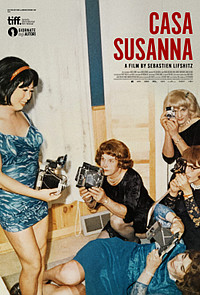 dir-scr Sebastien Lifshitz prd Muriel Meynard with Katherine Cummings, Diana Merry-Shapiro, Betsy Wollheim, Gregory Bagarozy, Marie Tonell, Irene, Gail, Misty, Vicky, Sonia, Simone, Donna, Gloria, Christine Jorgensen release WP Sep.22 vff 22/France 1h37  TORONTO FILM FEST  Now streaming... |
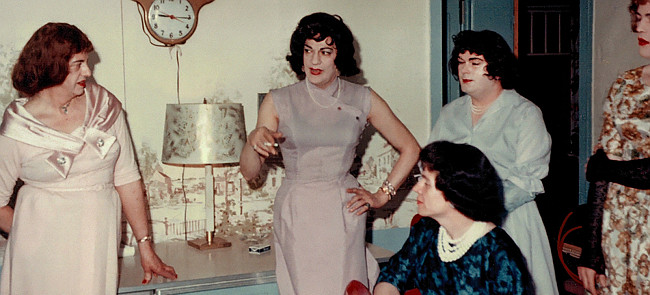 Illustrated with a wonderful collection of home movies and snapshots, plus some terrific scene-setting newsreel footage, this quietly observational documentary offers a glimpse into a secret society from the early 1960s where cross-dressers could gather without fear. Director Sebastien Lifshitz gets out of the way and simply allows these people and their children tell the story with colourful anecdotes, big feelings and a lovely sense of nostalgia. Contacting each other through ads in Transvestia magazine, cross-dressers gathered at a Casa Susanna, small wooden house in the Catskills. They considered themselves heterosexual, and their wives went along with them. And this sanctuary was an escape from the fear of everyday life. In 1962, it was rare for these often high-powered men to have this freedom to be themselves. Over the years, many realised this was who they were and went on to become trans women. And now revisiting the Catskills, they retell their stories, warmly recounting the most momentous events in their lives. The film allows two people to tell their stories to-camera, while also recounting how the Chilean-born Marie (aka Susanna) established this getaway. Now in her 80s, Katherine had to leave her family in Australia, and Marie's house became the essential place where new life started. Despite feeling sheer joy there, she tried to live as a man for decades before transitioning. Slightly younger, Diana remembers isolated life as a child in religious Iowa, praying to wake up in the morning as a girl. So she hoped it would just go away, played it safe and just got married. Then years later, she found herself. Both describe the small pleasures at Casa Susanna, things like curling their hair or wearing high heels. Mainly it was the promise that authenticity was possible. In addition, second-generation interviewees Betsy and Gregory recall stories about their connection through a parent or grandparent, and the way they began to understand what this place meant on a much larger scale in a society in which there was nowhere that was safe to even ask questions about this topic. Katherine and Diana recall being told by family and friends that they should simply stop thinking about being female. But that was impossible. And when they dressed up together at weekends, they weren't vampy; they were just middle class women in their Sunday best. They simply yearned for acceptance as in a society where they were was against the law. So it's lovely to see how they found peace later in life as women, many even receiving acceptance from loving parents and children.
| ||||||||||||
|
Eternal Spring Review by Rich Cline | 
| |||||||||||||
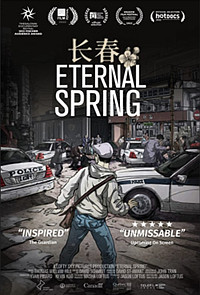 dir-scr Jason Loftus prd Jason Loftus, Yvan Pinard, Kevin Koo with Daxiong, Jin "Mr White" Xuezhe, Wei "Little Wei" Kisheng, Lan "Xiao Lan" Lihua, Wang Jianmin, Zhang Zhongyu, Wang Liansu, Wang Huilian, Henry Guo, Shi Jan, Ben Li, Yu Feng release UK/US 21.Oct.22 22/Canada 1h26 Now streaming... |
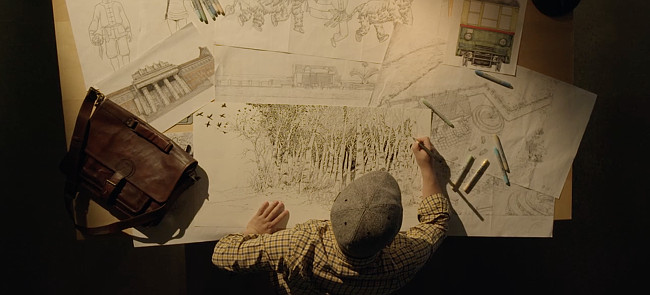 Documenting a momentous story from China, filmmaker Jason Loftus uses eye-catching animation to recreate events that could never be photographed. Details come from first-hand witnesses who narrate the film in new interviews alongside archival material, creating a vivid portrait of a plucky group of people who stood up against the tyrannical Chinese government. So the film plays out like an elaborate heist thriller, and it's all true. In March 2002, China's state television was hijacked by a banned spiritual group called Falun Gong in their continuing effort to correct the government's false narrative about them. From their secret hideout, they managed to pull off something that seemed impossible. But the police cracked down with a heavy hand, ruthlessly pursuing their suspects, imprisoning those who survived torture. Today in Toronto, gifted artist Daxiong uses lavishly detailed animation to combine his personal memories with those of others who managed to get out. And revisiting these memories brings back some difficult feelings. Daxiong also flashes back to how he discovered Falun Gong, a Buddhist offshoot with a simple goal to promote truth, compassion and tolerance by developing a healthier body and mind. The group fell afoul of officials because it was too difficult to control, so it was branded an "evil religion" and tarnished with a series of lies while practitioners were persecuted, assaulted and murdered by police. So of course staging an elaborate operation to take over a TV station was going to make things even worse. Depictions of police violence are jaw-dropping in several horrific sequences. Daxiong recreates these and other scenes using shared memories, animating them in a gripping cinematic style with staggeringly visceral details. As he compiles the story, the cameras follow him to Korea to meet with Jin, a cohort who also escaped from China. They and others others recount astonishing stories of protests, arrests, imprisonment and a daring prison break. The hijacking itself is exhilarating, but the torture is deeply distressing. As these people recall their experiences, strong emotions emerge. They are reliving the feeling of being accused by the state of being pure evil, and then of fleeing their homes to find refuge abroad. As one survivor says, this isn't about what's legal, it's about what's true. And their torturers even admitted they were bad guys determined to crush them. This is an important, inspiring story that's only been told here thanks to the courage and skill of those who survived.
| ||||||||||||
|
Shall I Compare You to a Summer’s Day? Review by Rich Cline | 
BERLIN FILM FEST Now streaming...
| 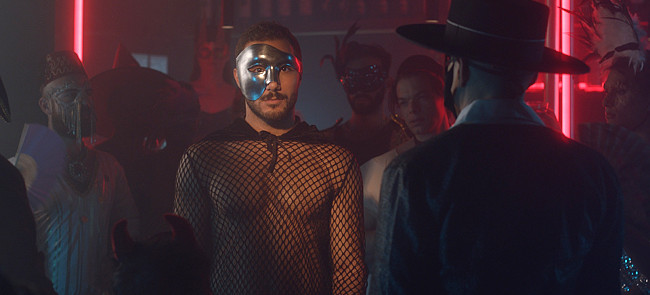 Based on "love diaries", this is a bold exploration of love between Arabic men. It's a remarkable collection of tales that inventively and honestly explore masculinity through a queer eye. And since this is a dramatised documentary from Egypt, it carries a strong sense of how illicit same-sex relationships are in this part of the world, as well as the joy that comes from being able to be yourself. Singing songs and recounting memories, a large number of young men reminisce about their various romantic encounters. Scenes play out in nightclubs, massage parlours and through phone dating apps as these guys describe everything from random encounters and three-way relationships to break-ups and the nature of monogamy. Woven in between this is a fantastical legend about the love between a fisherman and a merman, and there's also a visit to a shooting session with a photographer and an underwear model. In each segment, these men describes things they hide because they love each other. Echoing Arabian Nights with its multiple storylines, filmmaker Hassan deploys a wide range of imagery that includes musical numbers, colourful animation, re-creations, surreal dance and tableaux that are both stylised and strikingly realistic. Some scenes are played out by actors while others have a more off-the-cuff documentary style. It's a colourful kaleidoscope of scenes that are playful and unusually truthful in the way they explore the feelings of men who are attracted to men. The frequent nudity is tasteful and sexy, while the general tone is witty and knowing. Songs are plaintive and earnest, performed by a soaring blend of male voices. Women also waft through the film here and there, but the main focus is on men in their 20s or 30s who describing their experiences both in voiceover and on-camera with an openness that wryly reflects their reluctance to talk about these things. Along with questions about hiding their love, they contemplate where these stories begin and end, because they seem to overlap and flow into each other. What emerges is a remarkably complex look at relationships in whatever form they take, including spontaneous affairs and long-term romance. The film is also a remarkable glimpse into a secret society of Arabic men who are able to live openly amongst themselves, hidden from their disapproving society. While accounts of sexual entanglements are familiar, it's the way they are assembled here with inventive sounds and images, that paints a powerful bigger picture.
| 
See also: SHADOWS FILM FESTIVAL © 2022 by Rich Cline, Shadows
on the Wall
HOME | REVIEWS | NEWS | FESTIVAL | AWARDS
| Q&A | ABOUT | TALKBACK | | ||||||||||


